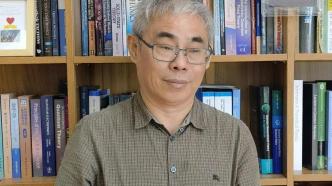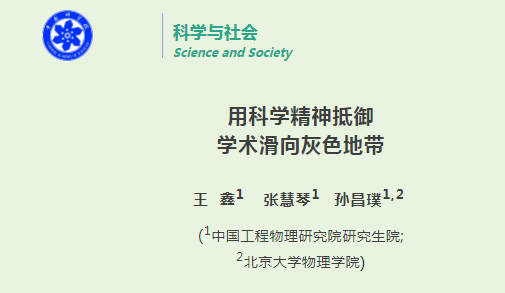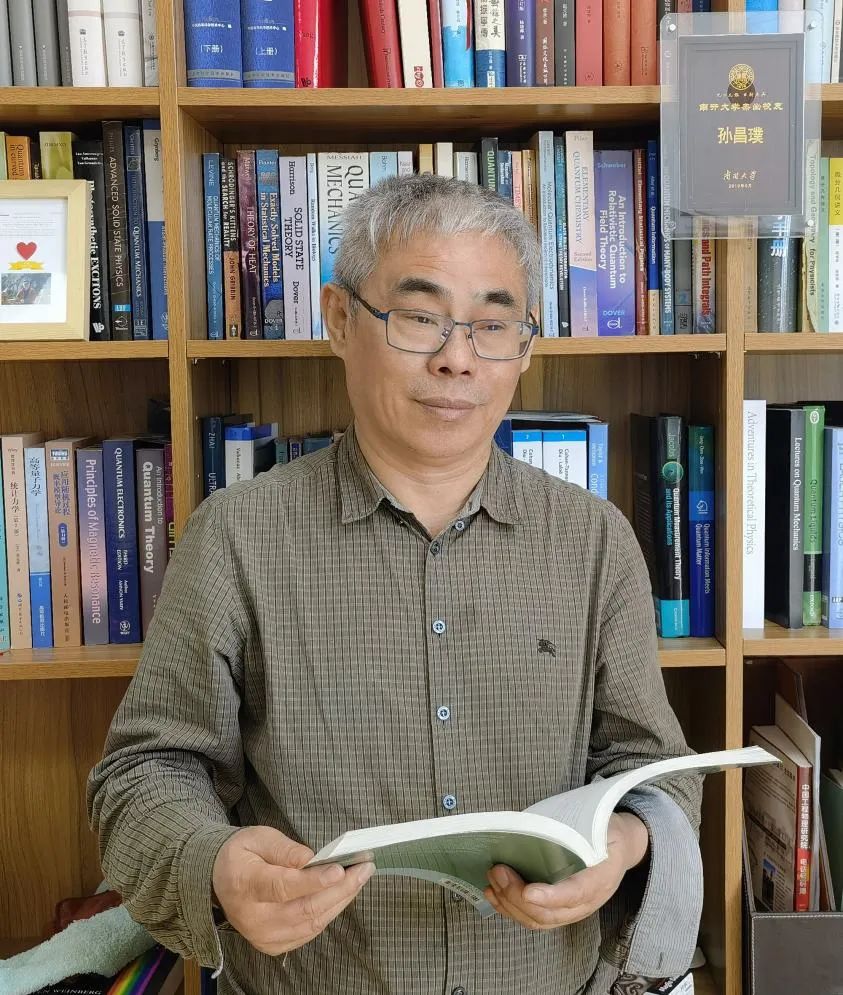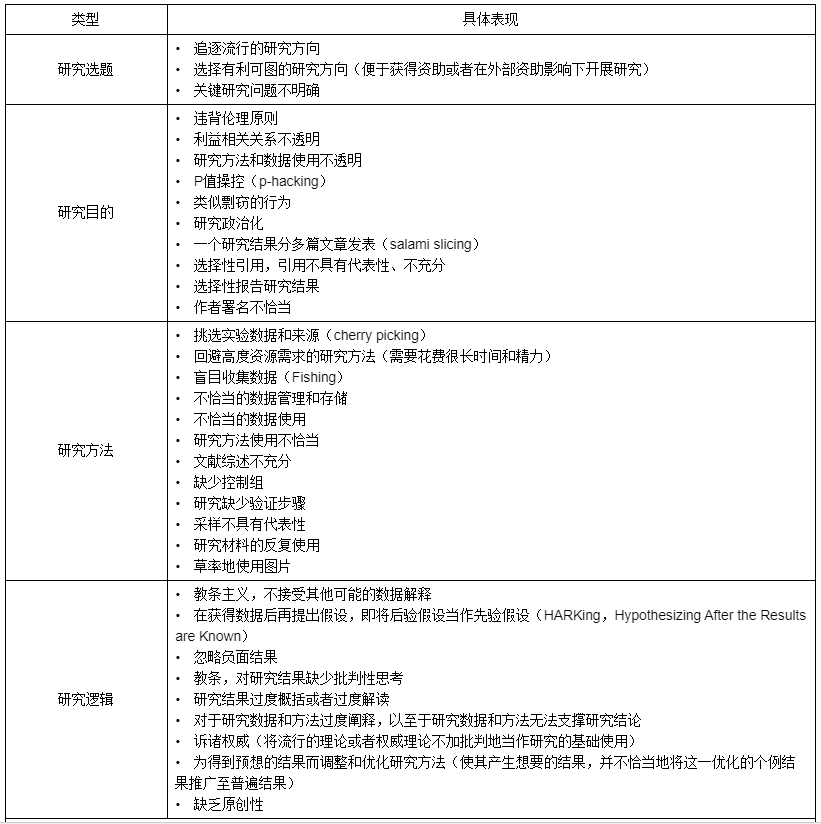
Recently, Changpu Sun, a well-known theoretical physicist and academician of the Chinese Academy of Sciences, published a paper on "Resisting academic slippage into gray areas".
In this article, behaviors such as "following hot spots", "credulity in authority", and "lack of originality" have all been included in the "grey list" of scientific research integrity.

Sun Changpu, a well-known theoretical physicist and academician of the Chinese Academy of Sciences, recently published a paper on "Resisting Academic Slipping into the Gray Area".
Soon, many scientist friends came to discuss with him:
"Aren't academic corruption and academic misconduct more serious? Why should you pay attention to some 'innocuous' 'gray behavior'?"
"What use can you write these articles?"
Sun Changpu's answer was: "I don't expect this article to be of any use immediately. Because I know that 'gray' issues are far more difficult to solve than 'black and white' issues. But someone has to say these things, if If no one speaks out about it, the problem will only get worse."

Photo courtesy of Sun Changpu interviewee
Recently, Sun Changpu accepted an exclusive interview with "China Science Daily" and expounded his understanding and thinking about the academic "grey area". Here's the main conversation:
"Chinese Journal of Science": Hello, Academician Sun! Your article mentioned 34 behaviors in the gray area of scientific research integrity (see the appendix), among which "inappropriate signature", "violation of ethical principles", "manipulation of P value" and so on are relatively easy to understand. But some behaviors seem to be just "not so good", such as: "chasing popular research directions", "unclear key research questions", "lack of critical thinking on research results", "lack of originality", etc. What do you think of these behaviors being included in the "grey list"? How to understand the harm of such behavior?
Sun Changpu: Behaviors such as "chasing popular research directions" are really not a big problem for individuals. There is nothing wrong with a young man doing some fashionable research directions. But if everyone goes in this fashionable direction, instead of choosing a research direction based on the understanding and judgment of science itself. What will happen?
First, it will be very "volume", with a large number of people crowded into a few popular fields to involve meaninglessly; second, no one will do truly original science, valuable science. This will not only cause a huge waste of social resources, but also seriously damage the credibility of scientific research.
" China Science Daily": This expression reminds me of an example: vaccination. Humans rely on vaccines to control some infectious diseases to a very low transmission state. When individual people don't get vaccinated, it seems like a personal choice; but if everyone doesn't get vaccinated, it can lead to very serious consequences. Can it be understood in this way that the harm of many academic "grey zone" behaviors lies in the formation of an "academic epidemic" and the destruction of the entire academic ecology?
Sun Changpu: Yes. After our article was published, many academics in the circle of friends came to me for inquiries and discussions. Some people say: We haven't even been able to effectively curb more serious problems such as academic corruption and academic misconduct. Is it too advanced to propose "resisting academic gray zone behavior" now? Is this necessary?
But I just think that due to the long-term accumulation and group occurrence of academic "gray zone" behavior, the harm is no less than academic corruption and academic misconduct. Because all these people know that "black behavior" is wrong, and those who defy the law are a minority after all. However, some "grey behaviors" that everyone feels are harmless and can even benefit, will quickly attract a large number of ordinary people to follow and follow, and fundamentally destroy the entire academic environment and the soil of technological innovation.
"China Science Daily": This kind of harm is indeed very serious. Are there any actual cases that prove that "grey behavior" can indeed cause such serious consequences?
Sun Changpu: We mentioned a very typical case in our article: how is the "angel particle" demonized?
In 2022, the journal Science retracted a very famous paper: the first evidence of the existence of "angel particles" - Majorana fermions. This work was once regarded as a "Nobel Prize-level discovery".
In fact, a large number of experimental studies on Majorana fermions have been retracted in recent years.
Why does this phenomenon occur?
Because when theoretical physicists make some shocking theoretical predictions, many experimental physicists are very eager to "confirm" these predictions. Therefore, in their work, they will intentionally or unintentionally process data with some subjective tendencies, such as selecting data that strengthens the research conclusions and ignoring those data that weaken the research conclusions.
When many people do this, they don’t feel that they are “falsifying”. He just thinks that those famous theorists have said so. My results are consistent with what he said. Could it be wrong?
Therefore, we can see that some researchers took chances at first, pandered to authority, and neglected self-discipline, but as a result, they produced a large number of misleading "scientific research results", and even led the entire field astray. And these researchers who have not developed good scientific research habits and rigorous academic style may also fall into the quagmire of academic misconduct step by step.
"China Science Daily": The cases you described are touching: "chasing hot spots" and "credulity in authority" are common weaknesses in human nature, and sometimes they are even regarded as "human nature". But scientific research is a career that places great emphasis on rigor and pragmatism. A little carelessness can lead to very serious consequences.
Sun Changpu: Yes. So we also see that in many cases, the more great a scientist is, the easier it is to accidentally step into the "grey zone".
Because when you are not well-known and have made something innovative, many people will doubt you, and you need to go through a lot of work to prove that you are right. This process can help you separate the false from the true, and understand your achievements more objectively.
But when a well-known scientist makes a new result, many people will follow him and "help" him to prove that it is right, which is very dangerous for a scientist.
Human nature is similar, and academic "grey area" behaviors also exist in various countries. But in a more mature academic environment, it is difficult for these behaviors to become mainstream in academia. However, our country is still too tolerant of flawed academic behavior, especially for flawed "big scientists", which requires extra vigilance.
So I have always emphasized that these "gray area" behaviors should be dealt with more seriously.
"China Science Daily": We have noticed that the measures you proposed to resist academic slippage into the "grey area" are relatively soft "advocating the spirit of science". Some readers may feel that this is not enough because of the lack of strong external constraints. What do you think of this?
Sun Changpu: The reason why "grey zone" behavior is difficult to deal with is that it is not black and white. Rigid rules like laws and regulations are difficult to apply to these "gray" issues.
The nature of scientific research and innovation activities determines that they cannot be controlled by particularly rigid means, and they will die if they are controlled too much. Moreover, the more highly original research work, the more suspicious it seems in the early stage. At this time, there should still be a relatively relaxed environment, allowing researchers to make bold assumptions and carefully verify.
And "scientific spirit", although it sounds flexible, I think it is also rigid to some extent. To achieve a certain level of scientific research work is "conscience work". The key to preventing the academic environment from slipping into the "grey zone" is the shame of every scientist. In an environment, everyone knows what is good and what is bad. Scientists who are pragmatic and self-disciplined can get due respect; people who are opportunistic and eager for quick success cannot enter the mainstream. Only by doing this can the spread of the "grey zone" in academia be truly curbed.
I had a student before, and he went to another research group for a while. When he came back, he saw me buried in the office and asked: Teacher, are you still pushing the formula yourself? I slapped the table on the spot: Mr. Yang Zhenning was still calculating things by himself when he was over 70 years old. Not every scientist gave up the front-line work early! Later, this student told me that this incident had a profound impact on him, and since then he has been doing his studies honestly.
The style of study is passed down from generation to generation. The best way I can think of to resist academic slipping into the "grey zone" is that every "big scientist" starts from himself and takes the lead in promoting the scientific spirit.
"China Science Daily": "Great scientists" should take the lead in promoting the spirit of science. So what should young people do?
Sun Changpu: Young students often come to me and ask me: If others are chasing hot spots and doing research that is easy to produce results and papers, and I, like you said, do research that overcomes difficulties every day, will it be a problem? Very disadvantaged?
I think these concerns are very normal. I would tell them: Even if you do those "trendy" research for a while, don't forget that it's not really what you're after. When you gain status and resources one day, you must return to your original intention and origin, re-examine the work you really want to do, and lead your students to do more important things. In this way, our scientific career can be done better from generation to generation.
No matter in which country or in which era, scientists need to deal with the contradiction between ideals and reality. British mathematician Andrew Wiles was under a lot of pressure when he first came to Princeton University in the United States. Fortunately, he has accumulated some work in his hands, and publishes an average of one article every year, using superficial "paddling" to buy time for his real scientific goal. In the end, he proved Fermat's last theorem.
I call this practice "eating from the bowl, watching the pot"—you can compromise for a while, but you can't lose sight of the true purpose of doing science as a career.
To do "conscience work".
Attachment: 34 Behaviors in the Gray Area of Scientific Research Integrity

Source: Author's summary based on Ravn and Sørensen (2021).
(Original title "34 kinds of behaviors are full of academic "grey areas"! Academician Sun Changpu: Scientists must have a sense of shame")
Related paper information:
10.19524/j.cnki.10-1009/g3.2023.01.001